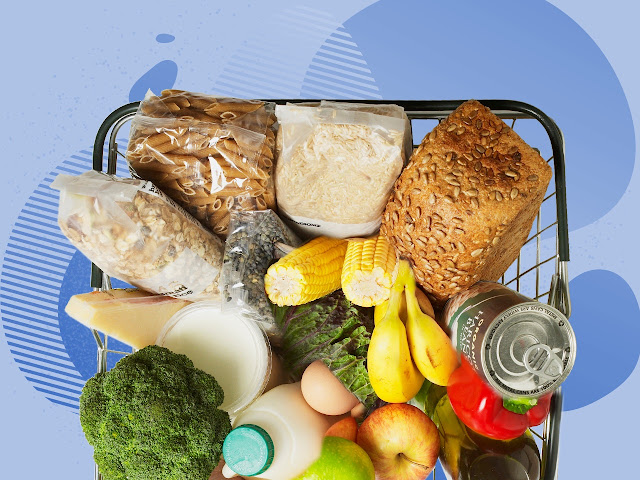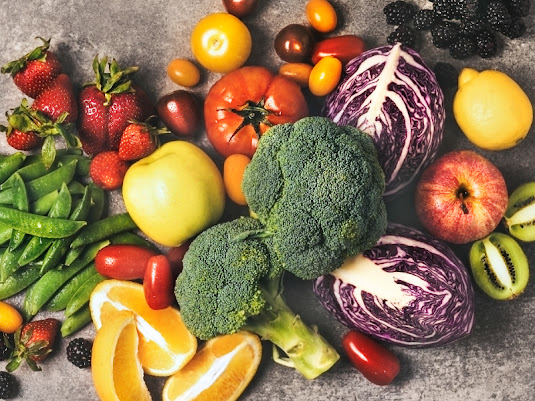At parties, I don't normally discuss how I help a living. I've immediately understood that a lot of individuals need to talk about food when they hear I'm an enlisted dietitian. I will in general get waylaid by guidance searchers, similar to the individuals who need my considerations on what they had for breakfast that day.

While I love discussing sustenance (it's my work!) And I'm eager to hear that others are likewise considering food, I simply don't feel as good giving out guidance at a mixed drink party as I do in a more expert setting. That essentially boils down to the way that everybody is extraordinary and numerous responses to nourishment addresses will descend to your remarkable wellbeing, propensities, way of life, what not.
Yet, hello, I identify with how befuddling it tends to be to attempt to get nourishment. In this way, I as of late asked my web-based media adherents to send me their greatest sustenance questions. Obviously, they turned out to be ones I hear a great deal from customers too. Here are the responses to four basic sustenance addresses I get.
1. We should all attempt to avoid gluten, isn't that so?

Gluten isn't naturally terrible for everybody. You truly possibly need to go sans gluten if it's medicinally essential for some other explanation. It's basically a protein present in wheat, grain, and rye, as per the National Institute of Diabetes and Digestive and Kidney Diseases (NIDDK).
It bodes well for certain individuals to evade gluten, similar to those with celiac sickness, whose bodies essentially disdain this protein. In individuals with celiac infection, gluten can harm the small digestive system, prompting awful manifestations like swelling, stomach torment, the runs, clogging, gas, and heaving. At that point there are individuals with non-celiac gluten affectability (additionally called gluten narrow mindedness), who do not encounter the small digestive system harm however can in any case manage side effects like weakness and stomach torment subsequent to having this protein.
It could likewise be a smart thought to stay away from gluten on the off chance that you have a wheat hypersensitivity, which is basically a safe eruption to gluten or another wheat protein, the Mayo Clinic clarifies. Indications incorporate mouth and throat expanding or aggravation, hives, loose bowels, and in extreme cases, hypersensitivity (throat snugness that can prompt trouble relaxing). In the event that your wheat sensitivity doesn't explicitly incorporate gluten, you shouldn't go sans gluten, yet it's brilliant to get hypersensitivity testing so you know precisely the thing you're managing.
Individuals with peevish inside disorder may likewise profit by controlling their gluten admission, as exploration has shown that it might assist with manifestations like the runs. A 2015 paper in Nutrients clarifies that since certain individuals with IBS likewise have celiac infection or gluten affectability, different examinations have shown benefits in going sans gluten for specific individuals with IBS. It seems like going sans gluten may even assist individuals with IBS who don't have these conditions. Specialists aren't sure how IBS communicates with gluten. In any case, hello, anything to make IBS hellfire simpler may be great. In spite of the fact that, in the event that you can, talk with somebody like a specialist or enrolled dietitian prior to disposing of something from your eating regimen.
Thus, that was a beautiful extreme rundown of exceptionally legitimate motivations to in any event consider dodging gluten. Yet, in the event that you don't have these kinds of clinical issues, there's no reason for removing gluten of your eating routine. A 2018 article in Gastroenterology and Hepatology clarified that eating a medicinally pointless without gluten diet is probably not going to bring about generous medical advantages. Indeed, as the paper subtleties, it may very well be monetarily difficult on the grounds that sans gluten food can be costly as hellfire. It might likewise cause psychosocial issues for certain individuals since keeping a without gluten diet (or any eating regimen) can be genuinely depleting and sway your public activity. It could even prompt healthful insufficiencies in the event that you slice out an excessive number of food varieties to attempt to maintain a strategic distance from gluten. What's more, in case you're keen on nixing gluten to dodge calories, realize that a food isn't intrinsically better or less caloric just on the grounds that it's sans gluten.
Take it from me: You don't have to dodge gluten without any justifiable cause.
2. Do I truly have to have breakfast?
On the off chance that you find that morning meal is useful for keeping you full until lunch and boosting your energy levels, definitely, keep at it. Nonetheless, in case you're the kind of individual who never has breakfast and oversees fine without it, at that point there's most likely no motivation to begin eating it now.
All things considered, research on this theme is for the most part uncertain. For each examination that shows breakfast is useful for reasons unknown, there's another that shows the inverse. That is particularly evident with regards to weight, a significant focal point of breakfast-related exploration.
One winning way of thinking is that consistently having breakfast may assist with weight reduction by expanding digestion and boosting satiety (so you don’t eat all the more later to make up for your yearning). For example, a 2011 methodical survey in Obesity dissected 153 examinations having to do with eating conduct and weight, noticing that some little investigations have tracked down a likely connection between having breakfast and weighing less.
However, the other way of thinking is that skipping breakfast could help add to weight reduction if that implies eating in general less calories than ordinary in light of the fact that there's no assurance that it will prompt eating all the more later in the day. A 2019 BMJ meta-investigation of 13 examinations tracked down that, generally speaking, those in the included preliminaries who skipped breakfast in general would have somewhat lower weight. They likewise found no proof that skipping breakfast was related with higher in general food utilization.
It's difficult to tell where reality truly lies. As the BMJ study creators clarified, such an extensive amount of proof on breakfast and weight is inferior quality. There are heaps of possible defects with breakfast-related examinations, similar to that many depend on members self-revealing what they eat as opposed to scientists really following that data themselves. A considerable lot of these investigations additionally do not represent puzzling factors, similar to that that individuals who have breakfast or skip it might share other way of life propensities practically speaking that impact their weight. At that point there's the issue that a significant number of these investigations are little and led on such select pieces of the populace (like just men or just ladies under a specific BMI) that it doesn '
Likewise, some morning meal related examinations have been subsidized by organizations that have a stake in the game, similar to those that make oat. Furthermore, in those cases, it is anything but an immense astonishment when the examination tracks down some incredible advantages to having breakfast.
Maybe the bigger issue is that large numbers of these investigations center around breakfast's impacts on weight gain or misfortune when we realize that losing or putting on weight is a lot more convoluted than whether you eat this day by day supper. We realize that weight isn't the be-all, end-all referee of wellbeing, as well.
So, on the off chance that you will have breakfast since it's your main thing from the day or it gives you a huge load of energy or whatever other explanation, it ought to ordinarily incorporate a great deal of protein filling. (I say "commonly" on the grounds that there are those occasions when all you need is bananas cultivate French toast at early lunch, which is incredible.) Although this differs dependent on factors like your weight and action level, I suggest getting at least 20 grams of protein at breakfast to help keep you full. (That can be hard, however attempt to get 15 in any event. Here are a few plans to take care of you.) I additionally love to incorporate some empowering complex carbs (like entire wheat toast or cereal) at breakfast, which carries me to the following inquiry I get constantly.
3. Is it OK to eat carbs?
Allow me to place this on the whole covers for you: YES! Sugars are delectable, however they're feeding also. Carbs are our bodies' first-line fuel source, the NIDDK clarifies. You need carbs to work, full stop. In any case, there are times when it bodes well to change the number of carbs you eat or the sort you're normally remembering for your eating regimen.
For example, on the off chance that you have type 1 or type 2 diabetes, you should work with your PCP to decide the number of starches are alright for your day by day utilization since they influence your glucose.
Regardless of whether you don't have any kind of medical issue, in the event that you feel you're eating too many refined sugars (like in the event that you believe they're the motivation behind why you continuously feel lazy), scaling back may bode well. You do not have to eliminate these from your life, however zeroing in additional on complex carbs can be useful. Your body takes more time to separate the mind boggling carbs present in food varieties like entire grains, vegetables, and boring vegetables than it does the refined carbs in food varieties like treats and saltines. This keeps you full for more and gives all the more enduring energy.
I ordinarily suggest my customers get practically 50% of their calories from carbs, yet that is after I have broad discussions with them about how their bodies work and what their dietary objectives are. Everybody is unique. You may have to try different things with the quantity of carbs you eat to perceive what level causes you to feel and capacity your best.
4. For what reason is dairy abruptly annoying my stomach?
You used to have the option to get down to business on a cheddar plate without issue. Presently your stomach burbles in the event that you to such an extent as look at a wedge of brie. On the off chance that you regularly experience issues like bulging, gas, and stomach uneasiness subsequent to eating dairy, you could have lactose prejudice without acknowledging it.
After some time, your small digestive system can start to experience lactose processing issues, the sugar normally found in dairy, the NIDDK clarifies. It's uncalled for, I know. Furthermore, in light of the fact that this can create over the long run, it might take a piece for you to sort out precisely why your stomach gets disturbed each time you have dairy.
In the event that you figure you may have lactose narrow mindedness, see a specialist (preferably a gastroenterologist) who can analyze you without a doubt. From that point forward, your primary care physician or an enlisted dietitian can offer tips for adapting to lactose bigotry, such as eating hard cheeses that have less lactose than different assortments or utilizing supplements containing the lactase protein that will help you digest dairy.


0 মন্তব্যসমূহ